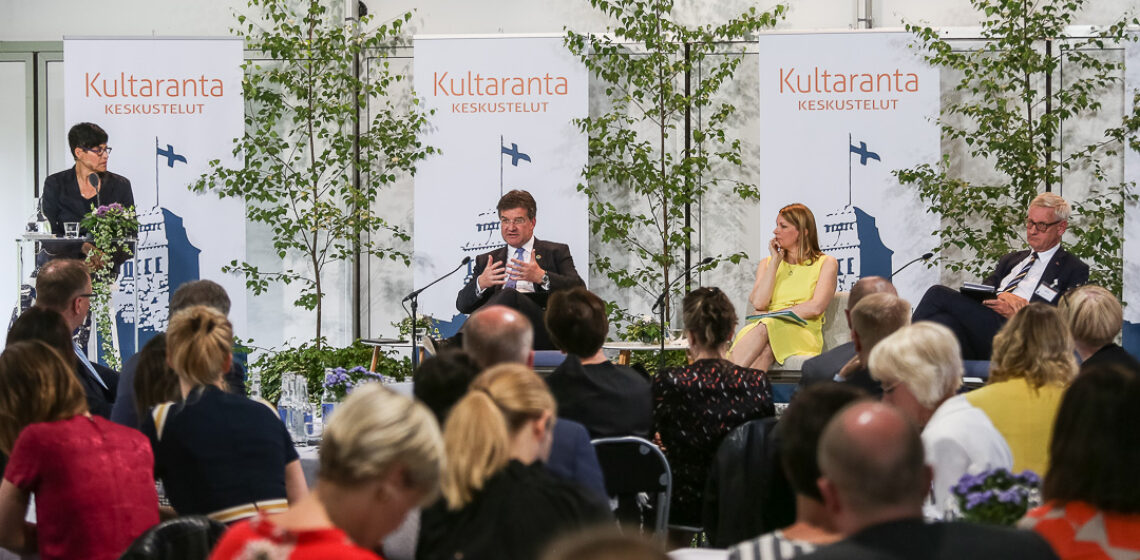The first of this year’s Kultaranta Talks, hosted by the President of the Republic of Finland Sauli Niinistö, focused on the growing role of power and strength in international politics, and the weakening of the rules based world order.
At the heart of the debate was the issue of how both citizens and political leaders around the world can be persuaded of the benefits of the rules based system.
For Miroslav Lajčák, President of the United Nations General Assembly, the answer to the question posed to the panellists on the first day, was a simple and self-evident one. “The answer to this dilemma is very simple; in the globalised world, it can only be the shared order. It’s clear that no country can deal with the challenges we face on their own.”
The real challenge, Lajčák added, is not choosing the better option, but the question of what the international community is going to do with the current situation. The international community, he argued, has sought to address the situation, initially through denial and then through appeasement, “but now is the time to fight back, to take action”.
An even more robust defence of the rules based order was made by Carl Bildt. “The liberal global order has been an absolutely astonishing success and has achieved things that very few thought were possible,” Sweden’s former prime minister and foreign minister argued, attributing this unprecedented accomplishment to the process of globalisation.
Mari Kiviniemi, Deputy Secretary-General of the OECD and former prime minister of Finland, brought an economic perspective to the debate, highlighting what makes multilateralism such a necessary feature of the global system. She pointed out that the trade in goods and services has grown four-fold since the early 1990s, while the number of internet connections, too, has proliferated. “There is no going back,” she concluded. For Kiviniemi, the rules based system is crucial for solving the challenges created by economic growth around the world.
Rules based world order under challenge
Invited by moderator Tuija Talvitie, Executive Director of Crisis Management Initiative, to put forward their views, the panellists agreed that the rules based world order is currently facing a serious challenge. In their unanimous view, this was to the detriment of smaller states in particular. In terms of the causes of the current instability, the panellists identified the change the approach taken by larger global actors. Carl Bildt characterised Russia and China as “rule changers”, while describing the United States as a “rule denier”.
After opening remarks from each of the panellists, the discussion turned to what could be done to reinstate the status of the rule based order.
Addressing Carl Bildt, Erkki Tuomioja MP asked why the success of the international rule based order is not better recognised around the world. Mr Bildt responded by saying that the benefits have been largely financial but people’s concerns are cultural. It is the “cultural insecurity” that is the problem, he said, not the economic insecurity.
In Miroslav Lajčák’s view, international institutions are not delivering on their full potential and there is less and less dialogue taking place, while messages about the benefits of the multilateral global system are not reaching people. People, he said, “have stopped believing that we are dealing with their problems. We must be able to use the language they can understand.”
Towards better times?
Mari Kiviniemi pointed out that more research into globalisation will be needed if the international community is to tackle the challenges it poses. She went on to highlight the creation of better social safety nets and high-quality housing as examples of potential solutions. With regard to sustainable development, Kiviniemi stressed the role of the private sector in identifying and financing solutions.
President Niinistö asked the panellists for their views on when we might expect the current situation to improve. Referring to Joseph Schumpeter’s notion of constructive destruction, he enquired whether things would have to get worse before they could get better. The panellists were unanimous in their view that the problems facing the rules based system would continue to escalate but also agreed that there were plenty of opportunities for positive action.
- Video recording on Yle Areena
- Kultaranta Talks
- 6/17/2018 UN Secretary-General Guterres at Kultaranta: Lack of trust most serious problem facing world today
- 6/17/2018 President Niinistö opens Kultaranta Talks: international order facing challenge – concrete action required to change direction
- 6/17/2018 Opening remarks of the President of the Republic of Finland Sauli Niinistö at the Kultaranta Talks on 17 June 2018
- 6/17/2018 Remarks by President Martti Ahtisaari at the Kultaranta Talks 2018: “Power and Strength or a Shared Order?” in Kultaranta, 17 June 2018
- Participants of the Kultaranta Talks in 2018


